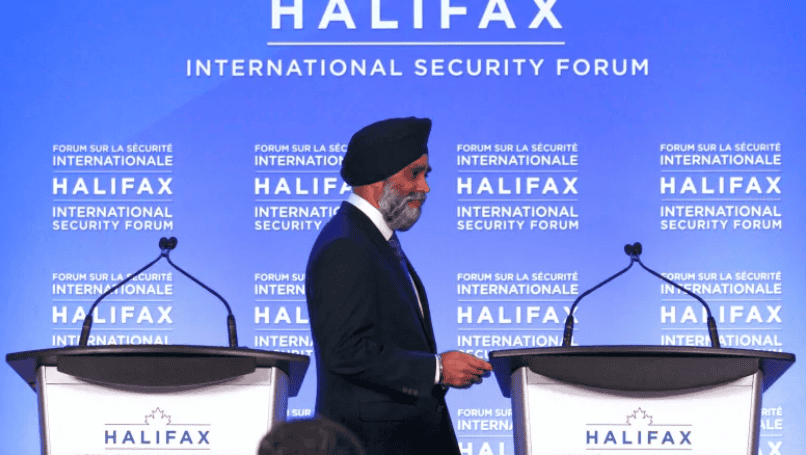
U.S. lawmakers delivered stern warnings about the Chinese telecom giant at security forum
Huawei, the Chinese telecom giant, is a “Trojan horse” that could restrict Canada’s access to the critical Five-Eyes intelligence-sharing community, the Trump administration’s top security adviser and senior U.S. lawmakers warned Saturday.
Robert O’Brien, the recently appointed White House national security adviser, painted a stark picture of Chinese intelligence gathering vast reams of data on ordinary Canadians, if the Liberal government doesn’t ban Huawei from helping build the upcoming 5G network.
“The Huawei Trojan horse is frightening. It’s terrifying,” O’Brien told journalists in a roundtable question and answer ahead of his appearance at the Halifax International Security Forum.
He linked developments in artificial intelligence, facial recognition advances, surveillance cameras and advanced data-gathering through wireless networks and warned of China’s ability to harness all of it.
‘They’re going to know everything’
“The technology allows China to put together profiles of the most intimate details, intimate personal details, of every single man, woman and child in China. When they get Huawei into Canada or other Western countries, they’re going to know every health record, every banking record, every social media post; they’re going to know everything about every single Canadian.”
The data-gathering already underway on Chinese citizens makes the activities of Facebook and Google “look like child’s play,” O’Brien said, adding that countries have to decide whether “they’re prepared to surrender every single bit of data on their citizens.”
Asked if Canada’s intelligence-sharing relationship with allies would be put at risk by allowing Huawei into the country, O’Brien said intelligence sharing “would be impacted if our close allies let the Trojan horse into the city.”
U.S. lawmakers delivered a similar stern warnings about the Chinese telecom giant at various points during the security forum.
Democratic and Republican senators spoke with one voice, saying the dangers of proceeding outweigh the benefits.
Canada is among a handful of select Western democracies with a decades-long intelligence-sharing arrangement with Washington. The Five Eyes countries also include Australia, New Zealand and Britain.
Canada’s participation could be in jeopardy, said a leading Democrat on the U.S. Senate Intelligence committee.
“It would make it very difficult to have a full intelligence-sharing information with a partner who has installed a direct line to Beijing,” said Maine Senator Angus KIng, who noted he was not speaking for the Trump administration, but as a committee member.
The U.S. has been urging allies to reject Huawei participation in building the new 5G wireless network over fears that Chinese intelligence services could have easy access to data through the company.
Some of the Five Eyes intelligence-sharing partners, notably Australia, have heeded the warnings, but Canada’s Liberal government is still reviewing the issue and his signalled a decision likely won’t come until next year.
King said there was bipartisan agreement in Washington when it comes to Huawei.
“We differ sometimes on issues, but not on this one,” he said. “The risks of Huawei coming into your country far outweigh any benefits.”
Information potentially at risk
Republican Senator Jim Risch, chairman of the foreign relations committee, urged the Canadian government to pay attention to its intelligence services and choose security over consumer convenience.
“I would hope the Canadian government — like any government — as they sort through this get briefed by their intelligence agencies as to the risks involved with signing up with a company that is fully controlled by the Chinese Communist Party,” said Risch.
“When any information goes to Huawei or through Huawei, the Chinese Communist Party will have access to that information. Is it worth it to save a little money by buying a cheaper system? My conclusion is a resounding no. I would hope the Canadian government will reach the same conclusion.”
During a security forum session Friday, he said the top secret briefings he’s received have convinced him there is a clear danger and all of that information has been shared with the Canadian Security and Intelligence Service and other agencies.
“Canadian intelligence agencies are fully informed on this issue,” he said.
The Globe and Mail recently reported that the Canadian Security Intelligence Service (CSIS) and the Communications Security Establishment (CSE) agencies are divided over whether to ban Huawei 5G technology.
The Liberal government has asked the intelligence agencies to evaluate the risks related to the adoption of the Huawei 5G equipment for the national telecommunication infrastructure. The security agencies were also told to evaluate the economic impact for the Canadian telecommunications companies and consumers if Huawei is blacklisted.
That review is still ongoing, officials said.


